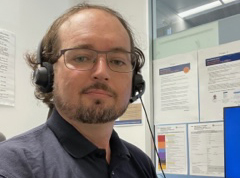Become a Lifeline Crisis Support volunteer from home

Lifeline Queensland is calling for volunteers to train as Crisis Supporters from the privacy and comfort of their own home.
At the same time as supporting the in-demand national network, volunteers will be able to build the Crisis Support skillset in regional and remote areas.
While prospective volunteers must go through a rigorous check prior to the commencement of training to ensure their self-provided technology, internet speed and workspace is suitable, volunteers will have flexibility of location and shift times.
Dominic Owens, Lifeline Rockhampton Service Leader, is excited to present important volunteer opportunities to people in remote areas who are keen to give back.
“Online information sessions are available for anyone interested in how they can support Lifeline as a Crisis Support volunteer,” Mr Owens said.
“All the training is provided online and coaching is provided virtually – meaning people don’t have to travel to a larger town to take part.”
Mr Owens says the advantage of remote volunteering is that you don’t have to be located in a central hub, adding that there are plenty of reasons why becoming a remote volunteer is highly rewarding.
“Apart from personal growth and development, becoming a Lifeline crisis support volunteer can increase your self-awareness and is the perfect way to give back to community,” he said.
Accredited Lifeline Crisis Supporters can also potentially become eligible to be Lifeline Community Recovery Officers during times of natural disaster or community crisis in Queensland.
“We also find many of our volunteers then go on to pursue further study in this field, or that it supports them with current study in Psychology, Counselling or Social Work,” Mr Owens said.
Self-care practice is something volunteers must also ensure is part of their daily routine.
“All participants must have a strong self-care routine in place – we regularly check-in with them to ensure their wellbeing,” Mr Owens said.
“Putting yourself first is always the priority before you can help others.
“Our volunteers come from all walks of life – with our telephone crisis support service available 24/7, it can fit in with the schedule of university students, retirees, people looking for extra experience or those looking to give back to community.”
Information sessions are being held via Zoom in July and August. For further information on training, and to register your interest, visit http://www.myuniting.care/crisisvol or contact the Lifeline Rockhampton office.
“We welcome anyone who has a desire to help others to contact us to find out more,” Mr Owens said.
---ENDS---
To find out more, or for interviews, please contact:
Lauren Barrett
lauren.barrett@ucareqld.com.au, 0423 652 588














